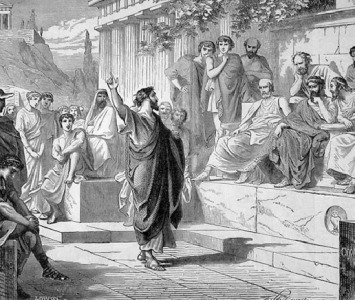A brief history of the Baptist churches.
Casual reading on this subject will lead one to believe that there is no consistent standard on which to determine what is and what is not Baptist. I recommend the Reformed Reader web page to get a helpful overview, but remember, any link recommended does not mean full endorsement of everything on a page. Careful discernment must be used in all things. Contact us from the home page if you have questions that we can help you with.
-Historically, the Puritans never reformed the Church of England, despite noble efforts on their part, and during the unstable times of England, many separated religious groups emerged, including Baptists by name. -We believe that the truths espoused by Baptist brethren today have been held in one form or another, one level of purity or another throughout history since the time of Christ. Not all believers became "Catholic" but either were underground, or fled. However, we do not believe that John the Baptist, was in fact, the first "Baptist" preacher, as some believe.
-What we know of the modern Baptist movement really took name and origin in England and Holland in the early seventeenth century.
-Baptists emerged out of intense reform movements, that were shaped by Puritanism, Separatism and possibly Anabaptism.
-Men like Ulrich Zwingli, John Calvin and events like the English Bible, the adoption of the teaching of Baptism of Believers only formed much of the framework for where we now stand. Those who began baptizing by total immersion were quickly labeled as Baptist.
-Two major groups of Baptist brethren begin to make clearly defined boundaries: The General Baptist and the Particular Baptist. -The General Baptist believed in a "general" atonement. They believed that the death of Christ was "general" in its application; that is, one can voluntarily be saved by his own volition, or free will. -They were less influenced by John Calvin, and more heavily influence by the Dutch Theologian, Jacob Arminius, whose doctrine taught the possibility of falling from grace. The earliest known church of this persuasion was formed about 1609.
-Later a group emerged known as Particular Baptist in the 1630's. Under the influence of John Calvin, and this group became the larger and more dominant group, issuing the London Baptist Confession that wielded great influence on the churches of that time, even until today.
-We are closer to the Particular Baptist in that the men of our congregation, by ordaining Elders actually allow them to rule the affairs of our local assembly, and our doctrine stands apart from the General Baptist as well. -This is only a snap shot of church history, and certainly not one that is comprehensive. But it is a general overview of those formidable and critical times in Baptist history.
-Historically, the Puritans never reformed the Church of England, despite noble efforts on their part, and during the unstable times of England, many separated religious groups emerged, including Baptists by name. -We believe that the truths espoused by Baptist brethren today have been held in one form or another, one level of purity or another throughout history since the time of Christ. Not all believers became "Catholic" but either were underground, or fled. However, we do not believe that John the Baptist, was in fact, the first "Baptist" preacher, as some believe.
-What we know of the modern Baptist movement really took name and origin in England and Holland in the early seventeenth century.
-Baptists emerged out of intense reform movements, that were shaped by Puritanism, Separatism and possibly Anabaptism.
-Men like Ulrich Zwingli, John Calvin and events like the English Bible, the adoption of the teaching of Baptism of Believers only formed much of the framework for where we now stand. Those who began baptizing by total immersion were quickly labeled as Baptist.
-Two major groups of Baptist brethren begin to make clearly defined boundaries: The General Baptist and the Particular Baptist. -The General Baptist believed in a "general" atonement. They believed that the death of Christ was "general" in its application; that is, one can voluntarily be saved by his own volition, or free will. -They were less influenced by John Calvin, and more heavily influence by the Dutch Theologian, Jacob Arminius, whose doctrine taught the possibility of falling from grace. The earliest known church of this persuasion was formed about 1609.
-Later a group emerged known as Particular Baptist in the 1630's. Under the influence of John Calvin, and this group became the larger and more dominant group, issuing the London Baptist Confession that wielded great influence on the churches of that time, even until today.
-We are closer to the Particular Baptist in that the men of our congregation, by ordaining Elders actually allow them to rule the affairs of our local assembly, and our doctrine stands apart from the General Baptist as well. -This is only a snap shot of church history, and certainly not one that is comprehensive. But it is a general overview of those formidable and critical times in Baptist history.

